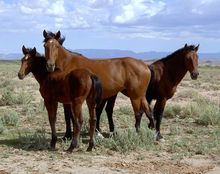Location: WASHINGTON, DC
The American Wild Horse Preservation Campaign (AWHPC), a national coalition, today responded to the Bureau of Land Managementâs (BLMâs) pending release of 2016 wild horse and burro population estimates by blasting the agency for fraudulent claims of wild horse overpopulation, which are based on unscientific and arbitrary BLM-imposed âappropriateâ management levels (AMLs).

Free roaming wild horses
Problem is federal mismanagement, not âexcessâ wild horses, the group says blasting the BLM for fraudulent claims of wild horse overpopulation, which are based on unscientific and arbitrary BLM-imposed âappropriateâ management levels.
© 2016 by Kersti Nebelsiek
âWild horses are present on just 12 percent of federal rangelands, which they share with livestock, and their habitat has shrunk by 40% over the last four decades,â said Suzanne Roy, AWHPC Executive Director. âThe feds consider 67,000 wild horses and burros to be overpopulated, yet there are only 70,000 big horn sheep remaining in the West and they are highly endangered."
âThe BLMâs claims of wild horse overpopulation are grossly exaggerated and designed to dupe the public into accepting the continued costly, cruel and unsustainable roundup, removal and stockpiling program,â she continued. âWe donât have an excess wild horse problem, we have a federal mismanagement problem.â
Roy said that the BLM now warehouses nearly 50,000 wild horses in government holding facilities, at a cost to taxpayers of more than $140,000 per day.
According to AWHPC, the BLM seeks to drive wild horse populations back to pre-1971 levels when Congress determined that the mustangs were âfast disappearingâ and in need of federal protection. Claims of overpopulation are based on BLM-imposed âAppropriateâ Management Levels, that allow for a maximum of one horse per 1,000 acres of federally designated habitat.
In 2013, the National Academy of Sciences conducted a thorough review of the BLM Wild Horse and Burro program and concluded it âcould not identify a science-based rationaleâ behind the BLMâs AMLs and that the AMLs were ânot transparent to stakeholders, supported by scientific information, or amenable to adaptation with new information and environmental and social change.â
AWHPC notes that public support for wild horses is strong. Polls show that nearly 1 in 3 Americans support protecting wild horses and burros on public lands and 80% of Americans oppose horse slaughter.
Instead of continued roundups, AWHPC promotes BLM reform toward a humane management approach that includes:
- Using of the proven PZP fertility control vaccine to reduce population growth rates.
- Developing public-private partnerships to implement humane management programs. The AWHPC is currently working through a Cooperative Agreement with the State of Nevada to humanely manage an estimated 2,000 wild horses on over 200,000 acres of habitat under state jurisdiction in northern Nevadaâs Virginia Range.
- Adjusting the artificially low and unscientific AMLs to accommodate current population levels and allow for the preservation of wild horses and burros in genetically viable herds.
- Developing mechanisms to allow for voluntary retirement of grazing permits in wild horse and burro Herd Management Areas and financial compensation (public or private) to ranchers for grazing permit retirement or non-use of grazing allotments. Compensating ranchers will be far cheaper than continuing to roundup, remove and stockpile wild horses in holding facilities.
The American Wild Horse Preservation Campaign (AWHPC) is dedicated to defending Americaâs wild horses and burros to protect their freedom, preserve their habitat, and promote humane standards of treatment. AWHPCâs mission is endorsed by a coalition of more than 60 horse advocacy, public interest, and conservation organizations.
